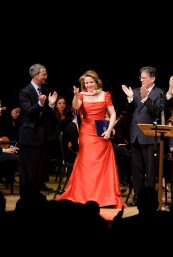Renee Fleming is shown after receiving an honorary doctorate from the Eastman School of Music in February 2011.
Soprano Renée Fleming (MM ’83) is constantly lauded as the pinnacle of the diverse, multifaceted, artist Eastman inspires us to be. For the “Music that Changed Me” feature in the Christmas 2014 BBC Music Magazine, she talked about the music that has inspired her the most over the years.
As a small child, she would sit and listen to Peter and the Wolf, allowing her imagination to follow. As a high school student, she attended a composition class at Eastman, where she heard Penderecki’s Threnody ‘To the Victims of Hiroshima.’ “It made such an impact on me: it was so unbelievably powerful, and spoke to me in a whole new musical language.”
Fleming’s journey towards a career was incremental; there was no decisive moment. “It was when I sang Countess Almaviva in Mozart’s Marriage of Figaro that I made my breakthrough…it’s a demanding role, you need courage.” If the 1990s was her decade of Mozart, then the 2000s belonged to Richard Strauss, from Arabella to Capriccio to the Four Last Songs.Her favorite role was the Marschallin from Der Rosenkavalier. “She is the most multi-layered and nuanced of Strauss’s heroines.”
Renée is also passionate about encouraging more composers to create interesting female roles, citing Mark-Anthony Turnage’s Anna Nicole and Andre Previn’s Blanche from A Streetcar Named Desire, a role she created. She is also an avid song recitalist. “A recording which changed my way of thinking was baritone Christian Gerhaher’s disc of Wolf’s Italian Songbook. His intense intimacy, that almost whispered quality, suggested a way forward, very different to the declamatory style of the past.”
She has also worked with contemporary pop songwriters. “I feel that since contemporary classical music cut itself into a rather small niche, the best songwriters have been working in popular music. Young singers ask me ‘Can we do that?’ but I remind them that (opera singers) are the heavy-lifters of the vocal world. There are no short-cuts to preparing our voices for the projection needed on stage, unamplified. Once you’ve done that, then by all means let your hair down.”
All of these lessons are important for us as Eastman musicians to remember. During the busy holiday season, with finals, projects, recitals, and concerts, we need to remember the reasons why music drew us in, in the first place and remember the songs that inspired us.
— Andrew Psarris, ‘15
